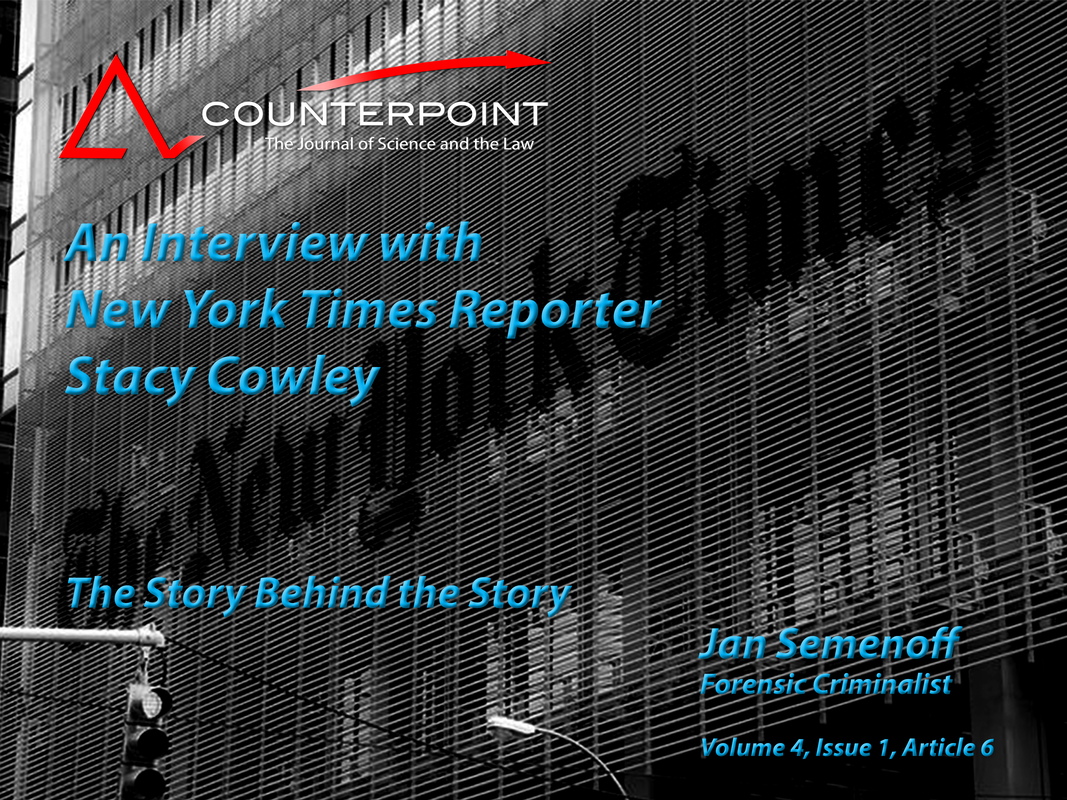An Interview with The New York Times Reporter Stacy Cowley:
The story behind the story
From - Counterpoint Volume 4; Issue 1 - Article 6 (Nov 2019)
Jan Semenoff, BA, EMA
Forensic Criminalist
A Counterpoint Exclusive...
In November 2019, The New York Times published a series of important articles examining the current state of forensic breath alcohol testing. I provided some background, and was interviewed by the reporters on a number of occasions. Since the publication of the Times articles, I had an opportunity to turn the tides, so to speak, and interview the lead reporter, Ms. Stacy Cowley, regarding their story. The full audio of the interview is available here, a Counterpoint exclusive.
After a year-long investigation involving hundreds of interviews with more than 70 key figures across the country, New York Times reporters Stacy Cowley and Jessica Silver-Greenberg have released the first in a comprehensive series of articles on breath alcohol testing in North America. The first story has generated considerable interest among various media outlets, and the public at large. By raising public awareness of some of the issues and concerns with breath alcohol testing, the articles may help shed light on the need towards greater levels of accountability among police and government agencies that use this technology in public prosecutions.
|
An Important Clarification
For the record, I met with Ms. Cowley on November of 2018 in New York. She interviewed me before a presentation I was giving for New York attorneys on the Intoxilyzer 9000. She then attended that presentation. After, we had two more opportunities to meet in person to discuss various issues in breath alcohol testing. I agreed to participate on the understanding that my quotes, if any, could be reviewed prior to publication. As a forensic criminalist who attends court on a regular basis, I felt I couldn't afford to have any quotes used out of context (with a greater concern that opposing counsel could use the quotes out of context, not The Times reporters, frankly). Ms. Cowley and her colleagues agreed to this condition. |
In the intervening year, Ms. Cowley, and her colleagues Jessica Silver-Greenberg and Singeli Agnew called me in person, plus emailed and texted a variety of questions to provide a background understanding of the technical and scientific issues involved. I also provided all the reporters in these articles, and a few others from other media outlets since, with full access to Counterpoint articles as a means of assisting them in getting a handle on these often complex issues. Ms. Cowley and I last spoke, and I sent a final email answering her last questions, about a week before the first article was published. I did not receive an advanced copy of any of the articles.
An Independent Inquiry
I need to clarify that my remarks and comments to the Times reporters were only technical in nature. Although we discussed certain cases I've consulted on for context, and a few emerging issues that are of concern, I did not at any time suggest that the Times reporters pursue any specific avenue or issue in breath alcohol testing. I find it interesting that their independent investigation identified many of the issues that some of us have been dealing with for years, and in fact, identified new areas of concern. Their reporting, and their findings, are not the result of prompting towards any one area or issue on my part.
I need to clarify that my remarks and comments to the Times reporters were only technical in nature. Although we discussed certain cases I've consulted on for context, and a few emerging issues that are of concern, I did not at any time suggest that the Times reporters pursue any specific avenue or issue in breath alcohol testing. I find it interesting that their independent investigation identified many of the issues that some of us have been dealing with for years, and in fact, identified new areas of concern. Their reporting, and their findings, are not the result of prompting towards any one area or issue on my part.
Interviewing the Interviewer
Since the publication of the Times articles, I had an opportunity to turn the tides, so to speak, and interview Ms. Cowley regarding the story. The interview was recorded, and is about 14 minutes in length. The audio of the interview is included here:
I do not plan on transcribing the interview.
Stacy Cowley: |
|
|
Links to the Articles:
Please follow these links to the New York Times articles:
- "These Machines Can Put You in Jail. Don't Trust Them." Stacy Cowley and Jessica Silver Greenberg, The New York Times, November 3, 2019. Taken from: https://www.nytimes.com/2019/11/03/business/drunk-driving-breathalyzer.html
- "An Unnamed Source Who Shouldn't Be Anonymous" Stacy Cowley, The New York Times, November 3, 2019. Taken from: https://www.nytimes.com/2019/11/03/reader-center/breathalyzer-drunk-driving-reporting.html
- "Five Reasons to Question Alcohol Breath Tests" Stacy Cowley and Jessica Silver-Greenberg, The New York Times, published November 3, 2019. Updated November 5, 2019. Taken from: https://www.nytimes.com/2019/11/03/business/breathalyzer-investigation-takeaways.html?
- "Breath Tests Aim to Stop Drunk Driving. Can We Trust the Results?" Producer/Director Singeli Agnew. The Weekly, Episode 18, The New York Times. Published November 1, 2019. Updated November 4, 2019. Full episodes available on FX and Hulu.
Stacy Cowley
Stacy Cowley is a finance reporter with a focus on consumer issues and data security. She previously reported on a variety of business topics, including technology and economics, at CNN Money, Fortune Small Business and other magazines and websites.
Stacy Cowley is a finance reporter with a focus on consumer issues and data security. She previously reported on a variety of business topics, including technology and economics, at CNN Money, Fortune Small Business and other magazines and websites.
Send me your questions or comments:
Comments and questions will be posted here with their responses:
Comments and questions will be posted here with their responses:
Stephen Biss, Ontario, Canada:
Well done Jan! For years, whenever talking to someone from the media, I've been asking them why there has not been investigative journalism on these issues. Your interview with Ms. Cowley gives some answers: Understanding the science and the law is very difficult and gathering the data, resources, and case law is very difficult and time-consuming.It's difficult enough for lawyers, but for the media and the public, the communication of all this shocking information is just too challenging. I'm going to pass on to my colleagues in Ontario, the quote from Ms. Cowley above. It says so much.
I used to hear the same question from judges at judicial pre-trials: "what do you mean we can't take a closer look at what's going on with them?" I don't hear that any more, I think because judges know that if every DUI trial lasts 6 days, we'll never get anything else done in the court house. As well, the mantra from police, the manufacturers, the state labs, and MADD has convinced the Canadian Parliament that approved instruments yield "conclusive proof". Bubba's concept of constitutional exemption has come to Canada. I think we should respond by doing exactly what you are, and Tom was, doing - writing and teaching and interviewing the media.
Well done Jan! For years, whenever talking to someone from the media, I've been asking them why there has not been investigative journalism on these issues. Your interview with Ms. Cowley gives some answers: Understanding the science and the law is very difficult and gathering the data, resources, and case law is very difficult and time-consuming.It's difficult enough for lawyers, but for the media and the public, the communication of all this shocking information is just too challenging. I'm going to pass on to my colleagues in Ontario, the quote from Ms. Cowley above. It says so much.
I used to hear the same question from judges at judicial pre-trials: "what do you mean we can't take a closer look at what's going on with them?" I don't hear that any more, I think because judges know that if every DUI trial lasts 6 days, we'll never get anything else done in the court house. As well, the mantra from police, the manufacturers, the state labs, and MADD has convinced the Canadian Parliament that approved instruments yield "conclusive proof". Bubba's concept of constitutional exemption has come to Canada. I think we should respond by doing exactly what you are, and Tom was, doing - writing and teaching and interviewing the media.




